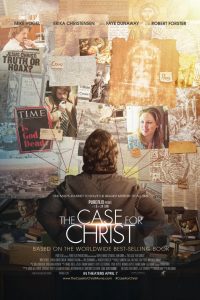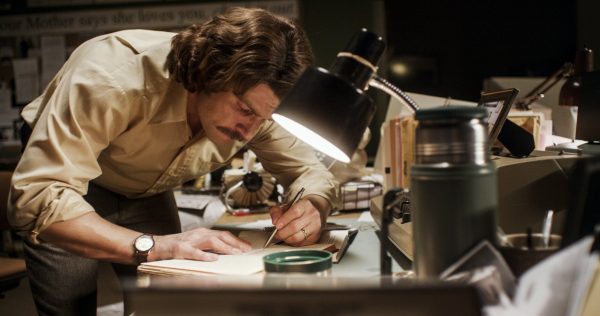The Case for Christ: Skeptical journalist jarred by ‘Good News’
Mike Vogel portrays investigative reporter Lee Strobel in The Case for Christ.
Lee Strobel – an award-winning legal journalist – seemed to have it all. A loving wife with two small children. A plum job as a reporter at the Chicago Tribune. And a new book recounting his observations while covering the Ford Pinto trial. Then his wife found Jesus and Strobel’s world started falling apart.
Tackling the tale of a self-proclaimed atheist who sets out to disprove the existence of God is The Case for Christ, a new film from Pure Flix and Triple Horse Studios.

Ably directed by Jon Gunn, the film follows Strobel’s compounding conflicts, as he battles his wife, his unfolding investigation, a mishandled story, and demons of his own making. The screenplay by Brian Bird is based on Strobel’s book of the same name, but for drama’s sake, a number of apologetic points appear to have been conflated. The result is a nearly seamless set of scholarly interviews intertwined with the inner workings of the newspaper business, and the emotional ride of two people grappling with questions of faith in the midst of an imploding marriage.
As the film opens, we see Strobel being celebrated by his colleagues at the Chicago Tribune. This is an old-school newsroom with crowded desks, clanking typewriters and hard deadlines. Strobel is at home in this world of skeptical souls, who are only as famous as their last byline. Then, a medical emergency catapults his wife Leslie into a world of hope and forgiveness – exacerbating a deep-seated anger and alcohol addiction Strobel barely keeps in check.
Blaming Leslie’s faith, and her new-found friends, for the growing rift in their marriage, Strobel turns his well-honed investigative skills into a one-man crusade to debunk Christianity. Using the power of the press, Strobel has unfettered access to some of the foremost experts in archaeology, psychology, ancient history, manuscript evidence, and medicine. Unfortunately, the more he learns, the angrier he gets. And the more his prejudices get in the way. A subplot about a police shooting becomes a painful reminder of the need to carefully consider every last detail.

Was Jesus’ body really absent from his tomb on Easter Sunday? “Yes – even his enemies admit it was gone,” says Dr. William Lane Craig.
Was Jesus seen alive after his death on the cross? “He was seen alive at different times and places by at least 515 people,” maintains Dr. Gary Habermas.
Could those post-death appearances be some form of mass delusion? “Absolutely not – it would be like two people sharing the same dream,” says fellow skeptic Dr. Roberta Waters.
Was Jesus’ death a sham? “Impossible,” says Dr. Alexander Metherell. “The Roman soldiers who carried out the crucifixion weren’t medical doctors – they were professional killers.”
Metherell’s analysis of Christ’s excruciating torture and ultimate death is the most graphic segment in the film (hence the PG rating). Plus, he sends Strobel back to Chicago with one more piece of compelling evidence: a well-researched article on the Crucifixion – not from some Evangelical tract – but in the peer-reviewed Journal of the American Medical Association.
With his marriage on the brink and his office now looking like a war room, Strobel is stymied.
Finally, his Tribune colleague, Religion Editor Kenny London says, “Do your job. Stack up the evidence, follow the facts and write the story – win or lose.”

Strobel has come to call his story, “The Investigation of a Lifetime”.
Those familiar with Lee Strobel (his books have sold in excess of fourteen million copies) already know how the very personal story behind The Case for Christ ends. Where this film really shines is in bringing Lee’s struggle alive, with a depth of realism which transcends the printed page.
Mike Vogel and Erika Christensen are outstanding as Lee and Leslie Strobel. Their emotions are raw – both when they love and when they argue. One truly gets the sense this is a couple that has been together forever. It should also be noted there is a pleasing subtlety in their respective performances. Vogel’s hidden anger is palpable, and his drunken behavior thankfully avoids the cartoonish moves often employed for effect. Likewise, Christensen comes across as completely earnest. Their chemistry, in large part, is what ultimately carries the film.
The supporting cast is equally commendable. Faye Dunaway (Dr. Waters) and Tom Nowicki (Dr. Metherell) offer the most engrossing performances amongst the expert witnesses. Plus they balance the story well – Dunaway as a steady, psychoanalytic voice to Nowicki’s more assertive medical doctor presence.

In the newsroom, Mike Pniewski shines in the pivotal role of Kenny London. His powerful, thirty-second dress-down of Strobel may be the tipping point of the entire movie.
Other players of note include L. Scott Caldwell as Leslie’s prayerful friend, Alfie Davis; Brett Rice as Strobel’s troubled agnostic colleague, Ray Nelson; Robert Forster as Strobel’s distant father, Walter; and Frankie Faison who portrays Lee’s hard-driving editor, Joe Dubois.
A special nod to young Haley Rosenwasser who is excellent as Alison Strobel – the little girl caught in the crossfire of a marriage gone bad and her dad’s sadly drunken antics.
One critique of The Case for Christ seems to be that Strobel did not interview any antagonists of the Christian message. Yet, it is clear from the film he immersed himself in the arguments presented by both sides. Another critique is, “This film did not make me a Christian.” Fair enough. But keep in mind that Lee Strobel spent a year and a half on his quest. It takes time to carefully piece together a mountain of evidence.
The Case for Christ film (and Lee’s other books) are designed to move the conversation along. In the end, it is up to either the viewer or reader to render a verdict for themselves. As the character Kenny Logan points out, “C. S. Lewis said, if Christianity is a myth, in the end, it is of zero importance. But if it’s true, there is nothing more important in the entire universe.”
Recommended to believers and skeptics alike.

Anthony C. Hayes is an actor, author, raconteur, rapscallion and bon vivant. A one-time newsboy for the Evening Sun and professional presence at the Washington Herald, Tony’s poetry, photography, humor, and prose have also been featured in Smile, Hon, You’re in Baltimore!, Destination Maryland, Magic Octopus Magazine, Los Angeles Post-Examiner, Voice of Baltimore, SmartCEO, Alvarez Fiction, and Tales of Blood and Roses. If you notice that his work has been purloined, please let him know. As the Good Book says, “Thou shalt not steal.”

